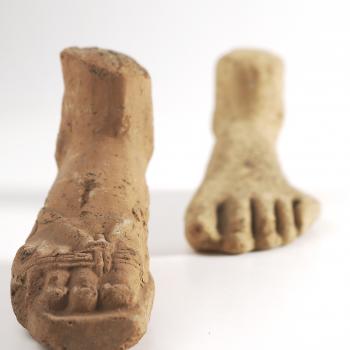Simcha Fisher has re-run her column of sage advice for priests to “survive” Mother’s Day.
This Sunday is, as you no doubt know, Mother’s Day, and a lot of your parishioners are going to expect you to acknowledge it. Also, a lot of your parishioners are going to be mad if you acknowledge it.
She offers an example of a beautiful blessing that manages to mention Mary’s motherhood while encompassing all women, whether or not they are mothers. It’s well-done, and manages to avoid most of the pitfalls awaiting the well-meaning priest should he attempt to actively single out mothers in his congregation for prayer and public acknowledgment.
It’s also unsatisfying.
When Anna Jarvis founded the modern Mother’s Day, she was adamant that it “be a singular possessive, for each family to honor its own mother, not a plural possessive commemorating all mothers in the world.”[13]
She meant it as a lesson in love for the individual women doing the largely unnoticed work of motherhood, and as a commemoration of individual mothers passed on. The date of Mother’s Day comes from the timing of Jarvis’s own mother. While Anna Jarvis may have been sentimental about the work mothers do, she was not under any illusions that this would be a day untouched by grief.
![By Gertrude Käsebier (American, 1852 - 1934) (1852 - 1934) – photographer (American) Details of artist on Google Art Project [Public domain], via Wikimedia Commons](https://wp-media.patheos.com/blogs/sites/754/2017/05/Gertrude_K%C3%A4sebier_American_-_The_Manger_Ideal_Motherhood_-_Google_Art_Project-e1494340835267.jpg)
I’ve wondered if perhaps she was from a generation less afraid of grief than we are today.
Two years ago, I wrote my own piece on the difficulties of Mother’s Day and the wounds people may feel keenly on this day that honors mothers.
Mother’s day has always, since its institution as a day in honor of mothers who have passed on, included a hefty dose of melancholy. Motherhood as an abstract represents a Great Good Thing–an idea of self-sacrifice that is constant and unnoticed rather than large and famous, a nostalgia for maternal warmth and acceptance that may or may not accord with the reality of messy lived lives and experiences.
In a lot of ways, Motherhood is an ideal which few of us can embody to our own satisfaction. And yet we recognize the good of it, and we celebrate that good even as we strive to more fully realize it in ourselves.
Mother’s day inspires a lot of angst in women. Women who cannot be mothers, women whose children are not living, those whose mothers are not living, those who feel like failures as mothers or like failures as children, or whose mother-child relationships are plagued by dysfunction. For those individuals, this commemoration and celebration of Motherhood can inspire grief.
But so it should–and that is not so much a reason to avoid celebrating as it is a mark of how Great a Good it is that we desire, mourn, strive for, and commemorate.
It is tempting to shy away from praising what is praiseworthy or admirable because of sensitivity to the pain caused by the absence of a good. But I’m not entirely sure it is wise to let pain, grief, and loss have the final word. This Sunday, perhaps we can pray that we all find the grace to rejoice with those who rejoice, even as we grieve with those who grieve. That’s a lesson for every day, but perhaps especially for this day, which turned the seeds of grief into carnations.
Image by Gertrude Käsebier (American, 1852 – 1934) (1852 – 1934) – photographer (American) Details of artist on Google Art Project [Public domain], via Wikimedia Commons












